The coming of age of a Black woman farmer
From the corn belt to the black dirt, the long way ‘round
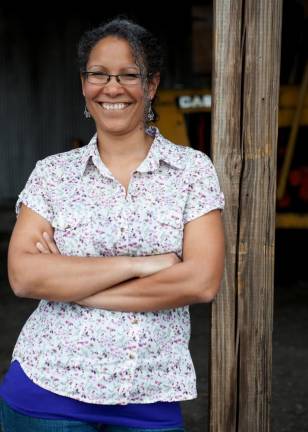
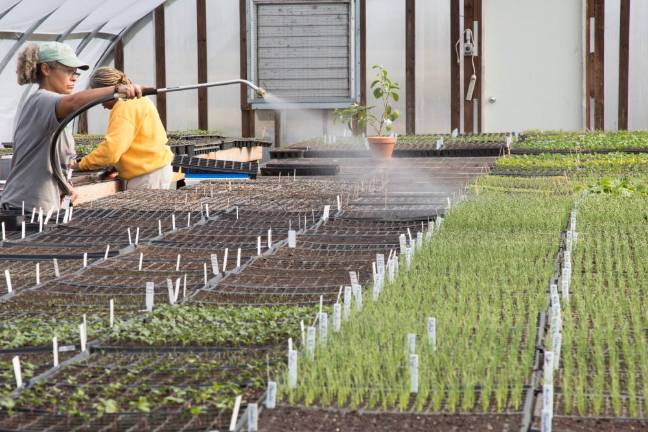
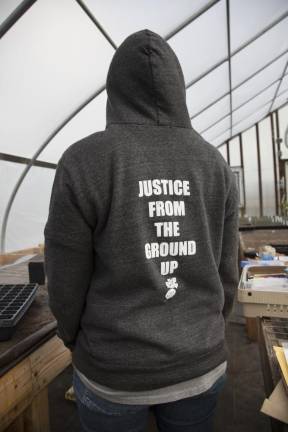
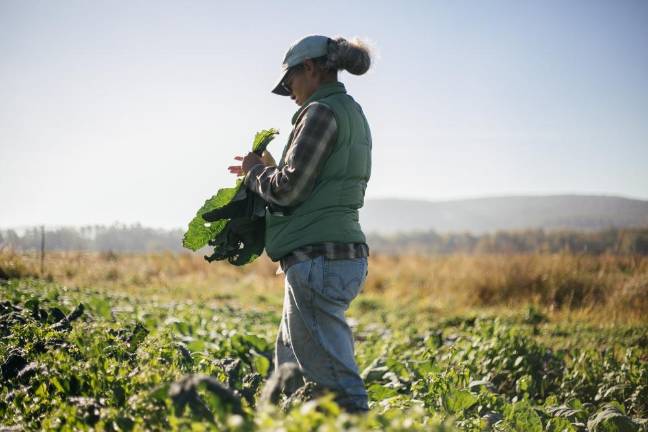
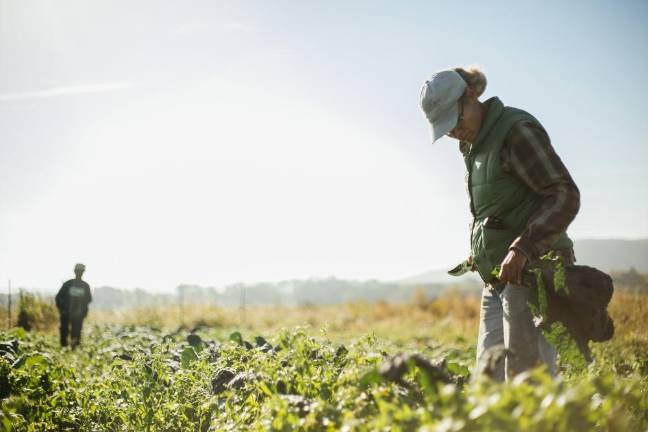
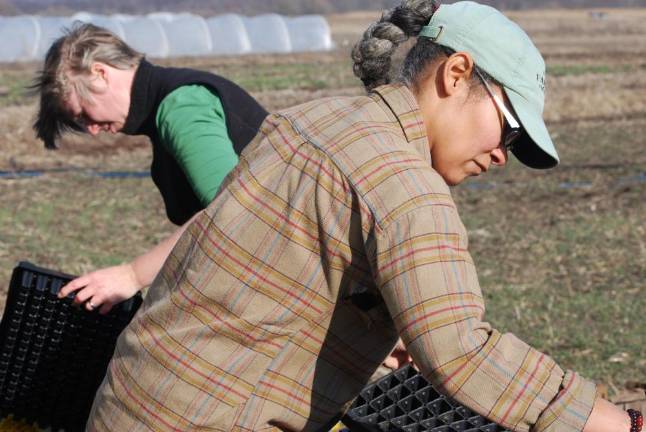
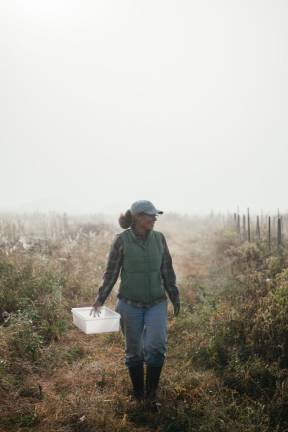
Editor’s note: This first-person piece was originally published in Dirt’s January ‘18 issue.
I grew up in Missouri, the “show-me” state. I identify as a Missourian: hard-working, stoic, skeptical of outsiders, stubborn. I feel nostalgic sometimes for the small rural towns, the corn fields, the looming unused grain silos, old farmhouses with their hidden rooms and dirt roads that frame my childhood memories. But mostly when I think about Missouri, I feel an endless sadness. From a very early age, I knew I would leave and not look back. I was born in Kansas City in 1974. My mom moved my brother and me to Green Ridge when I was five. The move took us from a racially mixed neighborhood to a town with a population under 500. My brother and I have different fathers; he and my mom are both white. The area is mostly agricultural, and most of my classmates’ parents were farmers. I was the only Black child or person of color, both in my school and in the larger community. We had moved the summer before I started kindergarten and lived with my aunt and her two boys. Another aunt lived nearby with her daughter. I had fun that summer getting to know my cousins and a family I didn’t know we had. We played in the corn fields, followed creek beds, had sword fights with thorns from honey locust trees, swam in giant horse troughs, baked mud pies... and then school started. My first memory of kindergarten is being called a nigger. It happened at the end of the first day. As I stepped onto the bus, one of the older kids shouted it. There was a commotion and I looked up to see my brother throwing punches. The bus driver started shouting and came to break them up. I didn’t quite understand what was happening and I was scared for my brother—though not too scared, because I could tell he was winning the fight. Unfortunately, he would get into more fights over the years with other classmates calling me names: nigger, Buckwheat, THAT THING.
My childhood memories from that time are a patchwork of racially charged events, from name calling to being ostracized in the lunchroom or on the playground. Once in fifth grade, I sat at lunch across from some of the more popular girls, and one asked me, “if your mom’s white and your dad’s Black, why aren’t you grey?” I learned to spend a lot of time alone, entertaining myself with books and an active imagination. I’d daydream about what life would be like when I grew up and was able to choose where I lived. I eventually stopped hearing the name calling because I was somewhere else in my head. I learned to ignore the staring that happened when I was in town with my family. And I focused on doing well in school. I knew that I would go to college, and I had thoughts when I was young that I wanted to be a child psychologist, then a fashion designer, then a writer, then a ninja (!), and eventually a college professor. But after all of that, 25 years later on the streets of New York City, I found myself wanting to be a farmer.
In times when my mom had more steady work and could be home to make dinner, we ate pretty well: homemade chicken and dumplings, sweet and sour meatballs, pork chops, bread from scratch. Later, she had a harder time finding work, and we were on and off food stamps, even when she was working two or three jobs. We depended on commodity food from the government that we’d pick up from a church: cheese, peanut butter, dried milk. Sometimes my mom bought Velveeta. She would make a cheese dip she called Rotel, with chiles, black olives and mushrooms, and when she could afford it, she would treat us to McDonald’s or Taco Bell. We ate a lot of stuff from cans. My brother would make me macaroni and cheese; I would roast hot dogs over the stove. One time, I remember my mom being able to buy milk from the dairy. It was the best milk I ever tasted, with cream on top... but it was just that one time.
In college, I didn’t think about food. I bought food at Wal-Mart, because no one even shopped at grocery stores. I started thinking about it differently when I lived in China as a Peace Corps volunteer. It was the first time I bought food from an open air market, because that was how everybody did it, and, other than that one time I tasted milk straight from the dairy when I was a kid, it was the first time I tasted real food.
The thought of being a farmer had never made my dream career list. It was probably the last thing I wanted to be. I knew the act of farming itself was important—it was how we got our food. But in rural Missouri, I was surrounded by farmland owned by one family; the farmers were all white men and the work was mostly done by giant tractors. I don’t remember any women farmers and I definitely never saw any other person of color farming. The only time I ever saw Black people on farmland was in movies like Roots and the 1985 ABC television miniseries North and South. All that I ever saw connecting Black people and land was Black people enslaved and forced to work a white master’s land.
At that age, processing that limited narrative of African-American history, I equated farming with slavery and it was not anything I ever wanted to do. Fortunately, I was one of those kids that succeeded in our education system, despite everything. I went to the University of Missouri in Colombia, and then spent two years in the Peace Corps teaching English in China.I joined the Peace Corps because I wanted to understand the world from another culture’s perspective — and then I moved to NYC and shifted from a career path addressing China’s environmental issues to realizing that the U.S. uses more of the world’s resources than anyone, and that meant I wanted to stay here and focus on how to help us become a better example for the rest of the world. I began looking for a community that reflected what I was beginning to understand as the connections between many different social issues, from racial and religious discrimination to economic injustice to environmental degradation, and that was actively involved in transformative social change.
It was five years before I got into food. I met people in organic farming through a job creating wind farms in the Northeast. I began volunteering on a small farm in upstate New York, and that was where I both started thinking about food through a political lens and began to develop my race consciousness. At that farm, where most of the people were white, I got into an argument with someone who was talking about a Black community where people had interrupted a town hall meeting about building a trash incinerator in the neighborhood. This person — who was white — was disapproving, like these people were just making too much noise. It triggered something in me; I felt like he was strangling me with his words and I couldn’t be quiet about it. I erupted at him: “When you are poor and Black and nobody is listening to your community, what are you supposed to do? How are you supposed to get people’s attention?!” I hadn’t grown up with stories of people of color speaking up for themselves. Speaking up in the places where I grew up, you ended up dead. I had it ingrained in me that it wasn’t safe to be Black. So as I began learning about resistance in Black communities, and community-based resistance and organizing of all kinds, it felt very powerful to me.
From that point, I started to get politicized. I started looking for jobs working on food justice, and I was hired by an organization in NYC called Just Food. What drew me in was their approach to community work. A community would invite them in to listen and learn about their assets and needs and how Just Food could help—rather than Just Food telling the community what it needed.
As a Black woman, raised in a white family from rural Missouri, my first challenge continues to be developing my own consciousness around Blackness and whiteness, the impact of colonization, the concept and process of decolonizing the mind, reclaiming narratives missing from U.S. history as it has been taught, and understanding my own internalized racism. The second challenge was finding myself, during this process of becoming increasingly conscious of race in terms of food justice, in rooms of mostly young white women who were the majority of people doing early non-profit-based work on food in New York City.
I was one of two Black women employed at Just Food when I started, and we were the only two people of color. Unlike at many places, as a staff we did talk a great deal about race: what did it mean to send white volunteers and AmeriCorps staff into Black neighborhoods; how could we improve outreach to recruit more people of color? But in general, there were very few people of color involved in what was becoming the food movement in New York City. I met long-time community garden activist Karen Washington early on; she told me she would count how many Black people were at food conferences, and it was usually one or two. Eventually, after attending too many conferences where Black people and communities were talked about but not represented, Karen and I, along with seven other women, founded Black Urban Growers (BUGS) and organized the first Black Farmers & Urban Gardeners Conference in 2010. Over 500 Black farmers, chefs, food justice activists, policy makers and students showed up. It made a difference—we’ve all noticed a rise in the recognition of Black leadership in the food justice movement, whether at conferences or on the staff and boards of non-profits.
Once I started working at Just Food, I began meeting Black community leaders and elders who gardened or farmed. I also eventually got a plot myself at Taqwa Community Farm in the South Bronx. Seeing people like Karen, and farmers Abu Talib and Bobby Watson at Taqwa—African-American New Yorkers who started community gardens and who had chosen to make agriculture such a big part of their lives— inspired me to think that farming might be something I would consider doing. Hearing stories from Karen and Talib, learning to tend my own little plot of land, and tasting the fruits of my own labor were all key in helping me break the slavery narrative that I associated with Black people farming. It began to show me that growing food has nothing to do with slavery. Slavery is about power and oppression; it has nothing to do with the skill and the desire to grow food.Through Karen and Talib, I began to develop a whole new narrative and image around Black people and farming. Talib talked about what he learned from his aunt in South Carolina about the medicinal uses of wild plants. He taught me to see community differently; his community included the bees and the critters in the soil, and it was important to him to take care of them as well. He helped me to reconnect to the land as a source of healing and nourishment, separating it from the trauma of slavery.It was Talib who first told me, “Whoever controls your breadbasket controls your destiny.” And from Karen, I learned the power of growing food as an act of resistance, a form of participatory democracy and a tool for community organizing. “Each one teach one,” Karen often says, and acts on it. Inspired by what I learned from Talib and Karen, I began to want to farm. It was as an act of resistance, and it was because I wanted the power of knowing where my food comes from and that it wasn’t produced at the expense and exploitation of another person or the land. And knowing what my mentors did for me, I wanted to be that Black farmer that inspired someone else to question their ideas of being Black and farming in the United States.And perhaps most importantly, whenever I worked in my little 10-by-13-foot plot at Taqwa, I didn’t want to go home. I would plan to work for two hours and still be there six hours later. When you’re doing something you love, time just doesn’t exist. I started farming because I enjoyed it and because I wanted there to be people who look like me farming. So I decided, why not be that person?
The reaction of Black people, even some of my friends, when I told them I was just gardening, let alone farming, was always, “We left that behind years ago; why would you want to go back?” That’s a real tragedy for us.The first way people of color have been oppressed in the U.S., historically, is by being forced off their land, taken and forced to work somebody else’s land, or having food used as a weapon of control. Black people, brown people and Native American people— we need to see ourselves growing our food, especially food that was indigenous to us, to heal that relationship with the land and the food. So many of us are not eating culturally appropriate foods; a lot of us don’t even think about the food that we’re eating. We’re too financially strapped to even wander in that direction, we just eat what we can get our hands on, so there’s still such a disconnect. But seeing people who look like us growing healthy food, having a spiritual relationship with the land, rather than one of oppressive entrapment and violence, is healing. Seeing that nurturing land and growing food and feeding your community can be a healing act—and a political act—is really important— just the visual of it.For me, having that first plot at Taqwa Community Farm and harvesting my first tomatoes was the first time that I ever felt free. It was this kind of freedom like I could do anything; as long as I grow my own food, I’ll be fine. It was the first time I felt that. It’s a feeling I hear a lot of people talk about when they grow food for the first time. It’s deeper than confidence; it’s a knowledge beyond intellectual know-how, knowing that you could be okay. For the African American community, gaining access to land and growing food can be powerful. Many people reconnect to memories they didn’t even know they had, memories of grandparents or aunties or uncles growing food and sharing it with them, the taste of it... remembering they’ve had real food before and realizing that what they’re eating now is not what they’re supposed to be eating and that they can make other choices. Gardens and farms can provide a space for people to heal from the traumatic history of slavery, of being forced to grow food for someone else. Those words don’t capture the violence; the demeaning and dehumanizing reality of what slavery was. For a lot of Black folks — me included, for a long time — if they’re not growing food or don’t have a connection to land and farming, farming equals slavery.
And even though we’re not being enslaved right now, the devaluing and dehumanizing still exists — that’s evident in the disproportionate rates of incarceration and levels of police brutality against Black and brown people, inequitable access to education, health care, healthy food and meaningful jobs. There’s a direct line from what’s happening today back to enslavement in agriculture, so to be in a space where you can disrupt that is immensely helpful.
Those associations don’t start to correct themselves until people can separate them and reclaim their own history; how farming was a way of life and expression of a culture before people were brought to this country and enslaved. From there, they can start thinking about agriculture in a new way, learning about slavery and rebuilding a missing narrative: the history of Blacks owning land, being successful farmers, having built entire vibrant communities. If you look in a history book, you don’t learn about Black people as farmers, you learn about them as slaves, and then you learn about people like Frederick Douglass and Harriet Tubman — people escaping and making a difference. You don’t learn that even during those harsh conditions, there were people who had found a way outside of that to build thriving communities based on agriculture. The story of slavery is not the only story for African Americans when it comes to land and growing food in this country.
We don’t talk enough about what democracy really means in this country. It’s become obvious to me as a farmer, trying to think through how to create a farm business that isn’t built on the exploitation of people and of the land and animals. It’s really challenging. Among so many other things, people don’t value food or the people who grow it. I was aware of this before I became a farmer, but it’s an everyday reality now that farming is my livelihood — as much as I can say it’s my livelihood, because I have to work other jobs to support myself. That’s not only true for me, a new farmer, still developing skills and learning how to structure a business, it’s true for people who have been at it for decades. We’re seeing farmers driven out of the business or forced into early retirement, because it’s such a financially difficult job. I’m personally feeling trapped in a system that dictates how I have to treat people as a business owner. It’s the biggest thing I’m grappling with: how we’re going to hire people and pay them, when we can’t afford to pay ourselves. Something has to change that isn’t just about policy, that isn’t just about race... it’s a fundamental respect for all life that we don’t have.At the end of the day, where are you buying your food, who are you buying it from? Where are you buying your clothes? Do you know who made them? The barriers to holding companies and the people who run our economy accountable are so high. I’m really starting to feel these questions experientially, because I want to create a business that doesn’t exploit people, that honors the land and animals— that is uplifting. I want to create a business where I don’t own anyone’s labor, where we all equally contribute to a common cause of supporting ourselves, each other, and communities that need it the most... But how do we do that within the current structures? We have not moved away from growing food being seen as a lower class job. We’ve only intensified it by adding race to the mix. Until we recognize the value of farm labor, we’re not ever going to have a sustainable, just food system.
And from there you can start talking about democracy, because it’s not just our farm system, it’s everywhere. People look down on farmers, still. They look down on farming as a profession. Having grown up in humble circumstances, it’s triggering, because it’s the same kind of attitude that people have towards poor people — there’s a lack of understanding of how hard it is to get out of poverty just like folks don’t understand how hard it is to be a farmer. In my first year as a farmer, I don’t think I understood how much I equated farming not only with slavery, but with poverty. To be a farmer today often means to live in poverty, unless you’re a really big farm.
No one chooses farming, because you can’t make any money. But we did choose it. So despite my love of the work and my commitment to learning and growing as a farmer, the financial impact of that choice was difficult, not just logistically, but psychologically and emotionally, wrestling with how I’ve put myself back in a space that I worked so hard to get myself out of as a kid. It also taps into some bitterness I’ve had my whole life about being judged, but now it feels even more personal because I’m part of a group. I got into farming in part because I wanted to know what it was really like to be a farmer. So now it’s not just for myself; I’m feeling this bitterness on behalf of all farmers and farmworkers towards people who assume that farm labor is easy. People are so far removed from where their food comes from that they don’t even realize there’s a human being involved, and that means they’re oblivious about the whole system and don’t want to pay the true costs of food.
Rise and Root Farm is a cooperative farm in Chester, New York that I started with women I met early on in my food justice work, Karen Washington, Jane Hodge and Michaela Hayes. My vision is for it to be a farm business that acknowledges the U.S. history of exploitation around agriculture and is choosing to create something different. Fair wages, yes, but more than that: a model where people are respected, where they want to come and farm, or work with us in whatever capacity. I would love to see everyone working in cooperatives. The way we’ve structured our economy now is that when you work for someone else, they own your labor, deciding what you get paid and all the rest. I envision a world instead in which businesses aren’t just operated for profit, but out of necessity and creativity, with a focus on building and supporting community, and growing healthy, vibrant people. I envision a new type of consciousness around the why and how we’re doing things. Putting respect for life — all life — back into the mix.I’d be happy just gardening, but what we’re trying to do at Rise and Rise & Root Farm is build space for people like myself; for people who have experienced oppression and violence to feel safe with the land. Some of the best experiences on our farm have been workdays focused on healing, where people can come and talk about how it feels to live in a country that says everybody has the right to pursue freedom and happiness, and yet police officers are gunning us down. Where members of the LGBTQ community can talk about their struggles. There are not enough of those spaces, particularly in the farm and agricultural world, where people who deal with daily oppression can reconnect to the land, feel safe, and feel energy around healing some of that trauma. We need spaces where we can be free of those feelings of oppression, and where our ancestors are acknowledged for their great contributions to agriculture. There is still oppression and trauma around farming, even in the sustainable agriculture world, among new and young farmers, and we need an alternative.
When we’re having a bad day, when we’re trying to get our budget to balance for this year, I remember this vision. It’s not that I don’t care about the business, but being able to provide that space... that’s why I wanted to farm.
Clevenger is a full-time farmer on Rise & Root Farm in Chester, NY that she founded together with three other women urban growers. She is a founding member of Black Urban Growers and a founding member of Farm School NYC.